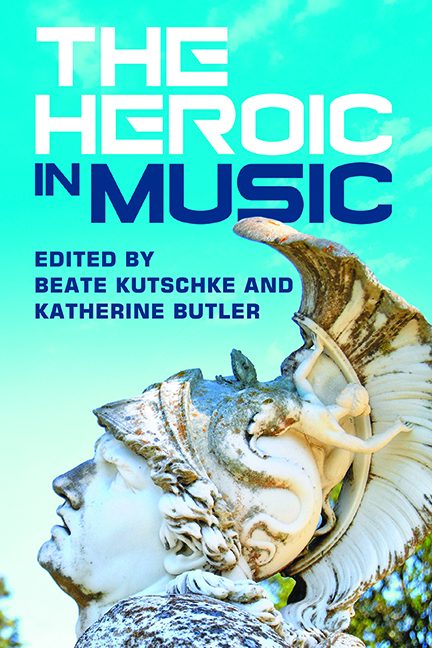Book contents
- Frontmatter
- Contents
- List of Illustrations
- Notes on Contributors
- Introduction
- Part I The Configuration of Heroic Music as a Tool for Shaping Moral and Political Identity
- Part II Music, its Ethics and Politics – Beyond ‘Beethoven Hero’
- Part III Heroic Music and its Moralities in Dictatorships and Post-Heroic Democracies
- Bibliography
- Index
8 - The Austro-German Heroic in the Music-Hermeneutical Era: Musical Discourse in the Service of Nationalist-Patriotic Armament between 1887 and the Early 1930s
Published online by Cambridge University Press: 16 July 2022
- Frontmatter
- Contents
- List of Illustrations
- Notes on Contributors
- Introduction
- Part I The Configuration of Heroic Music as a Tool for Shaping Moral and Political Identity
- Part II Music, its Ethics and Politics – Beyond ‘Beethoven Hero’
- Part III Heroic Music and its Moralities in Dictatorships and Post-Heroic Democracies
- Bibliography
- Index
Summary
National-Patriotic Armament in Germany after 1870 in the Youth- Pedagogical and the Music-Didactical Discourse
The idea of the heroic in music is the effect of the interplay of several components – a socio-political ‘(zeit)geist’ that feels drawn to attribute a heroic character to the actions and attitudes of individuals, a verbal discourse on music that characterizes musical configurations as ‘variants’ of non-musical phenomena, and, thirdly, compositional techniques that support such a view.
I will reconstruct these components in the German discourse of the period following 1870 – the German victory over France and the first unification of the German countries in Western history – and the early 1930s – the time at the end of the German Weimar Republic and the Austrian First Republic, and the seizure of power by the Nazis in Germany. This period was marked by numerous heroizations in the socio-political and musical discourse. It was not only the instigators of patriotism and nationalism who used the heroic zeitgeist and the tendency towards hero-worshipping to advance their political goals; at the same time, the music-hermeneutic discourse gained increasing importance in music literature – coincidentally, albeit not unsuitably. On the one hand, the musical discourse was based on ideas that described music in terms of human traits including heroic action modes. On the other hand, the discourse's participants believed that these action modes could be recognized in musical compositions and they associated them with compositional developments, at least since Beethoven, which underpinned the heroic musical discourse.
Following 1870, Germany (as well as other nation states in Europe) became increasingly patriotic, nationalist, and militaristic. In this politico-cultural climate, the heroic discourse praising the patriotic military-hero was popular, especially in the education sector. Numerous pedagogically oriented publications – textbooks for schools and youth literature – revolved around individuals to which their authors and editors explicitly attributed a heroic character. The publications pointed to heroes – and sometimes also heroines – from the past and the present: Greek and Roman fighters; Germanic legendary figures such as the Nibelungs; defenders of Austria against the Turkish threat in the sixteenth century such as Niklas Graf Zrinyi and Nikola Jurišić; and the combatants active in the wars of liberation from Napoleon (1813–15) and the First World War, such as the anonymous young victims from the battle of Langemarck.
- Type
- Chapter
- Information
- The Heroic in Music , pp. 145 - 158Publisher: Boydell & BrewerPrint publication year: 2022

